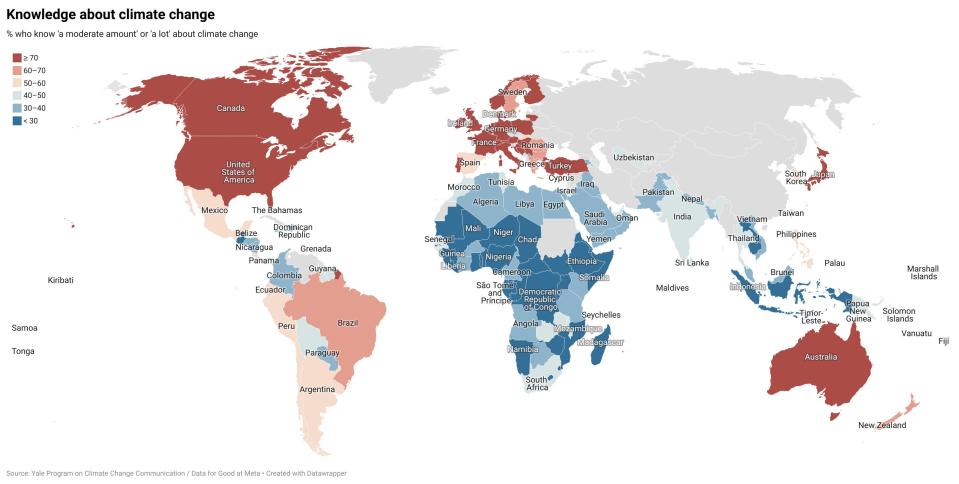What, me worry? Survey shows US less concerned about climate change than most of the world
While two-thirds of U.S. residents in a new international survey said they were worried about climate change, the nation stood out for being among those least concerned about the warming world.
In the survey of more than 100 countries released last week, some 67.6% of respondents in the United States said they were either “very worried or somewhat worried” about climate change.
Among the 24 western hemisphere countries included in the survey, only Haiti at 67.3% had fewer respondents worried about climate change.
By comparison, 95% of the people surveyed in Mexico and 93% in Chile and Portugal reported they were at least somewhat worried. Only Jordan (48%) and Yemen (31%) showed fewer than half of respondents were concerned.
The survey was conducted on Facebook by its owner, Meta, and the Yale Program on Climate Change Communication.
The partnership surveyed 100,000 people in 110 countries, territories or areas for their views on addressing climate change. Of those, only 13 were less concerned than the U.S.

What else did U.S. residents say?
Nearly (71%) said they know “a lot” or “a moderate amount” about climate change and 83% said they believe climate change is happening.
About 56% of the respondents in the U.S. said climate change will harm future generations “a great deal.”
Less than half — 41% — said they hear about climate change in their daily lives at least once a week.
U.S. respondents were split on who they believe is responsible for reducing the causes of climate change, with 25% thinking the government is most responsible, 36% answering businesses and 21% saying individual people.
About 40% of those surveyed said the U.S. should use less fossil fuels, such as coal, oil and gas, while 10% said the country should use more.
Of all those surveyed in North America, the U.S. had the largest percentage (11%) who said they don't think climate change is happening. That's compared with 6% of Canadian respondents and 7% of Haitians.
What else did the survey find internationally?
The majority of respondents in all the areas surveyed said they think climate change is happening, with 9 of 10 respondents in 21 counties and territories agreeing.
At more than 90%, people surveyed in Hungary and Finland were the most likely to say they know “a lot” or “a moderate amount” about climate change. Residents of Haiti and several countries in Central or West Africa (Benin, the Democratic Republic of Congo and Nigeria) were the most likely to say they’d never heard of climate change.
At 66%, people surveyed in Sweden and Germany were the most likely to say they hear about climate change in their daily lives at least once a week, while fewer than 10% of the respondents in Yemen, Algeria and Cambodia reported hearing about it that often.
In Romania, Uzbekistan and Lebanon, half those surveyed said the government is most responsible for reducing the causes of climate change. But in El Salvador, Zambia and Panama, about half said individuals were most responsible.
At more than 94%, people surveyed in Costa Rica, Portugal and Hungary were the most likely to agree that climate change is happening. At 67%, Laos and Haiti had the smallest percentage of people who agreed it's happening.
Those surveyed in Spain (65%), Sweden (61%) and Taiwan (60%) were the most likely to think climate change is mostly caused by human activities.
A tale of two countries
Yemen, a country on the Gulf of Aden in the Arabian Sea, and Malawi, a landlocked country in southeastern Africa, are only 1,700 miles apart, but they are at either ends of the spectrum when it comes to climate change, often falling into the highest or lowest percentages with their survey responses. Both countries were among those where fewer than 50% said they knew at least a “moderate amount” about climate change.
More: He got booted for discussing climate change. But he's undeterred, with science on his side
Respondents in Yemen were the least likely to say climate change was either “extremely” or “very” important to them and among the least likely to say climate change is either a “very serious” or “somewhat serious” threat to their country over the next 20 years. They were also among those least likely to think climate change is caused by humans.
People in Malawi were among the most concerned about the future. The 62% of respondents in that country who said they believe climate change will harm them personally "a great deal" was more than any other country. And the 85% of respondents in Malawi who see climate change as "a very serious threat" over the next 20 years was 14 percentage points higher than the next highest figures from Chile (71%) and Mexico (70%).
Why do the survey?
Survey organizers said they hope the findings will be used to inform policy decisions and priorities for governments, especially in countries where climate surveys had not been done before. Because the survey was conducted on Facebook, the authors said it’s likely the survey underrepresents areas of the world with lower income and literacy rates.
More: Survey by Facebook and Yale Program on Climate Change Communication
This article originally appeared on USA TODAY: Facebook survey: Climate change less a worry in US than most of world

